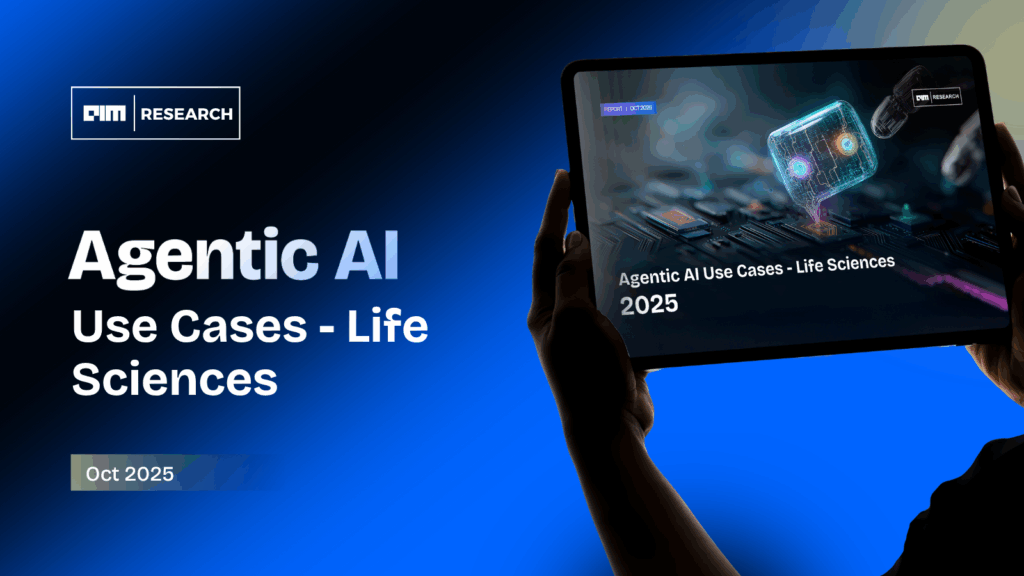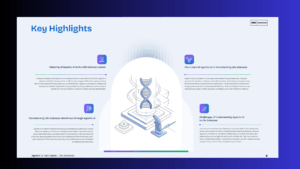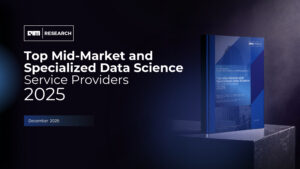

AIM Research’s analysis of ‘Agentic AI Use Cases – Life Sciences 2025’ provides in-depth insights into how pharmaceutical and biotech companies are adopting Agentic AI across the value chain. The report examines key application areas such as drug discovery, clinical trials, and regulatory affairs. It highlights key factors driving adoption including scalability, autonomy, complexity, and compliance, where it highlights where AI agents create the most impact by cutting R&D timelines, improving trial efficiency, and supporting regulatory compliance. The study provides an insight of how Agentic AI is reshaping life sciences and enabling next-generation healthcare innovation.
The life sciences sector is witnessing rapid evolution in the adoption of Agentic AI, with use cases offering critical insights into the industry’s maturity, demand, and strategic direction. Applications of Agentic AI vary widely across the value chain, from drug discovery and clinical trials to regulatory affairs. The report highlights the factors behind prioritizing use cases such as clinical trials and drug discovery, owing to its impact on reducing R&D timelines, optimizing trial design, and enhancing predictive accuracy.
Emerging use cases such are gaining momentum, highlighting the industry’s growing focus on precision medicine and personalized therapies. While these areas are still at a developing stage, high-priority applications including clinical trials and drug discovery are leading to faster adoption owing to their significant impact on scalability, efficiency, and compliance.
Adoption patterns are strongly influenced by integration capabilities and regulatory readiness. Organizations with established digital infrastructures and collaborations with technology providers are scaling Agentic AI across R&D and clinical functions. However, others face barriers such as siloed data, high integration costs, and stringent compliance requirements. Case studies highlight how early adopters are moving beyond pilot projects to enterprise-level deployments, demonstrating the transformative potential of Agentic AI in accelerating drug discovery, optimizing clinical trials, and strengthening regulatory workflows.

Table of Contents
1. Key Highlights
2. Introduction
3. Agentic AI Use Cases Across Life Science Value Chain
4. Framework for Evaluating Agentic AI Use Cases in Life Sciences
5. Case Studies – Deep Dive into Agentic AI Use Cases
6. Supply Side Perspective: Agentic AI Solution Providers in Life Sciences
7. Future Trends and Use of Agentic AI in Life Sciences Industry
8. Recommendations for Tech Buyers and Vendors
AIM Research’s Research Analyst will deliver a complimentary 45-minute session focused the report on – Agentic AI use cases in the life sciences sector. The briefing provides strategic insights tailored to tech buyers and vendors, including C-suite executives, product development teams, and business leaders. The content can also be customized based on organizational needs or executive roles.
Tech Vendors Perspective
Product and Development Executives: Gain insights into high-value use cases such as clinical trials optimization, drug discovery, pharmacovigilance, and personalized medicine, including technical considerations, scalability, and integration strategies.
Sales and Marketing Teams: Gain actionable insights to inform data-driven marketing strategies and optimize client engagement.
Strategic Roadmaps: Learn emerging trends, adoption challenges, and competitive positioning to guide product development and go-to-market strategies.
Tech Buyers Perspective
C-Suite Executives: Evaluate the strategic potential of Agentic AI for accelerating R&D, improving efficiency, and ensuring regulatory compliance, with insights on ROI and risk management.
IT and Digital Transformation Leaders: Gain a comprehensive view of Agentic AI applications across the life sciences sector, with specific insights into its use in clinical trials and other key life sciences processes. Understand approaches for vendor evaluation for Agentic AI Platforms in Life Sciences.
$3,000.00





